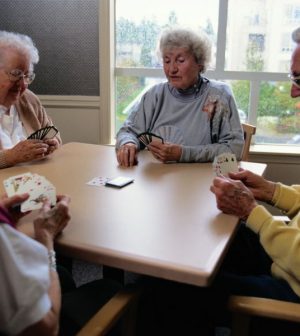- Could Your Grocery Store Meat Be Causing Recurring UTIs?
- Are You Making This Expensive Thermostat Error This Winter?
- Recognizing the Signs of Hypothyroidism
- 10 Strategies to Overcome Insomnia
- Could Artificial Sweeteners Be Aging the Brain Faster?
- Techniques for Soothing Your Nervous System
- Does the Water in Your House Smell Funny? Here’s Why
- Can a Daily Dose of Apple Cider Vinegar Actually Aid Weight Loss?
- 6 Health Beverages That Can Actually Spike Your Blood Sugar
- Treatment Options for Social Anxiety Disorder
Being Socially Active Helps Older Folk Age Well

Interacting with lots of different people may help you live longer and healthier, a new study suggests.
Older people who spend more time with family members, close friends, acquaintances, casual friends and even strangers were more likely to be physically active, spend less time sitting or lying around and have a more positive attitude and fewer negative feelings, the researchers found.
“Adults often grow less physically active and more sedentary as they age, and these behaviors pose a risk factor for disease and death,” said study author Karen Fingerman. She’s a professor of human development and family sciences at the University of Texas at Austin.
Fingerman said that it can be hard to get people to exercise, but it might be easier to get them to reach out to acquaintances, go on group events or talk to the people who serve in restaurants.
“Socializing in these contexts also can increase physical activity and diverse behaviors in ways that benefit health without necessarily working up a sweat,” she said in a university news release.
For the study, Fingerman and her colleagues asked more than 300 adults over 65 about their activities and social encounters every three hours for a week. Participants also wore electronic devices to keep track of their physical activity.
The researchers found that when participants were with a variety of social partners, they engaged in more activities, such as going out, walking, talking with others and shopping. They were also more physically active and spent less sedentary time.
Study co-author Debra Umberson, director of the university’s Population Research Center, said that most research on aging has centered on connections with close family and spouses.
“This new research relies on truly novel data that capture both the amount and quality of contact with all types of people that the elderly encounter throughout the day — and the results show us that these routine encounters have important benefits for activity levels and psychological well-being,” she said in the news release.
“This new information suggests the importance of policies and programs that support and promote routine and informal social participation,” Umberson said.
“Older adults may be able to be more sedentary with their close friends and family — sitting and watching TV or otherwise lounging at home,” Fingerman added. “But to engage with acquaintances, older adults must leave the house, or at least get up out of their chair to answer the door.”
This study showed that acquaintances could encourage older adults to be more physically active, to help their physical and emotional health, the researchers noted.
The report was published Feb. 20 in the Journals of Gerontology Series B: Psychological Sciences and Social Sciences.
More information
The U.S. Department of Health and Human Services offers more on healthy aging.
Source: HealthDay
Copyright © 2026 HealthDay. All rights reserved.










